

The Science Behind Those Obama Campaign E-Mails. One fascination in a presidential race mostly bereft of intrigue was the strange, incessant, and weirdly overfamiliar e-mails that emanated from the Obama campaign.
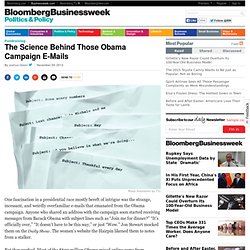
Anyone who shared an address with the campaign soon started receiving messages from Barack Obama with subject lines such as “Join me for dinner?” “It’s officially over,” “It doesn’t have to be this way,” or just “Wow.” Jon Stewart mocked them on the Daily Show. The women’s website the Hairpin likened them to notes from a stalker. But they worked. The appeals were the product of rigorous experimentation by a large team of analysts. It quickly became clear that a casual tone was usually most effective. Writers, analysts, and managers routinely bet on which lines would perform best and worst. Why Big Data Falls Short of Its Political Promise. Politics Transformed: The High Tech Battle for Your Vote is an in-depth look at how digital media is affecting elections.
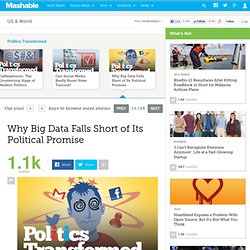
Mashable explores the trends changing politics in 2012 and beyond in these special reports. Why Mitt Romney Lost: A Simple, Overriding Theory - Andrew Cohen. If last night proved anything, it's that no serious political party in America can win an election by suppressing votes.
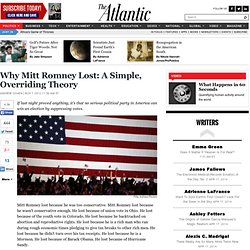
Philip Andrews/Reuters Mitt Romney lost because he was too conservative. Mitt Romney lost because he wasn't conservative enough. He lost because of union vote in Ohio. He lost because of the youth vote in Colorado. May I suggest instead a simple, elegant overriding theory on why we won't have a Romney Administration in 2013? That's my theory, anyway, and I'm sticking to it. Voter Suppression Backfires - Ta-Nehisi Coates. We talked yesterday about the kind of substantive reform the GOP could make in order to diversify.
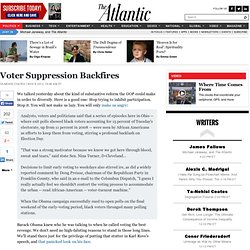
Here is a good one: Stop trying to inhibit participation. Stop it. You will not make us lazy. You will only make us angry: Analysts, voters and politicians said that a series of episodes here in Ohio -- where exit polls showed black voters accounting for 15 percent of Tuesday's electorate, up from 11 percent in 2008 -- were seen by African Americans as efforts to keep them from voting, stirring a profound backlash on Election Day. Barack Obama knew who he was talking to when he called voting the best revenge.
MORE: I should have mentioned this up top, but Andrew Cohen, whose done work on this front, looks at the long-term futility of attempting to win elections by shrinking the electorate: Jacqueline Kane is a winner today. People don't understand that the attempt to disenfranchise broad swaths of the American population is actually in this country's living memory. Social Demographics: Who's Using Today's Biggest Networks [INFOGRAPHIC] More than 66% of adults are connected to one or more social media platforms, but who exactly are these people?
![Social Demographics: Who's Using Today's Biggest Networks [INFOGRAPHIC]](http://cdn.pearltrees.com/s/pic/th/demographics-infographic-122100406)
The infographic below, created by Online MBA, breaks down the demographics, including education level, income, age and gender of social media users, along with other miscellaneous facts. Some sites' users are more demographically alike than others. One thing is the same for most social sites — college students, or those who have completed some college, represent the majority on social media sites like Facebook, Twitter, Pinterest, Digg and Reddit. Among Facebook users, 57% have completed some college, and 24% have earned a bachelor's or master's degree. Although, people 45 and older make up 46% of Facebook users. Social media sites are also seeing a gender split — women use social media more than men. Women gravitate toward Pinterest and young, techie men hang out on Google+. Apsrfeb08gerberetal. Obama Campaign Clawed Back After a Dismal Debate. ‘Dream Team’ of Behavioral Scientists Advised Obama Campaign. Did Facebook Give Democrats the Upper Hand? - Rebecca J. Rosen.
Upending predictions, young voters made a strong showing at the polls.
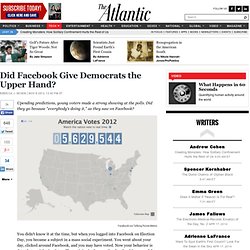
Did they go because "everybody's doing it," as they saw on Facebook? Facebook via Talking Points Memo You didn't know it at the time, but when you logged into Facebook on Election Day, you became a subject in a mass social experiment. You went about your day, clicked around Facebook, and you may have voted. Now your behavior is data that social scientists will scrutinize in the months ahead, asking one of the core questions of democracy: What makes people vote? Assuming you are over the age of 18 and were using a computer in the United States, you probably saw at the top of your Facebook page advising you that, surprise, it was Election Day.
ProPublica’s Message Machine is figuring out what the Obama campaign knows about me. Just how much do presidential campaigns know about the voters they’re trying to court?

The short answer: More than ever. But figuring out precisely how the campaigns use your individual personal data to target you personally is far more complicated, mostly because campaigns won’t say. So the data junkies at ProPublica set out to reverse-engineer presidential campaign messaging themselves. Here’s how their Message Machine works: